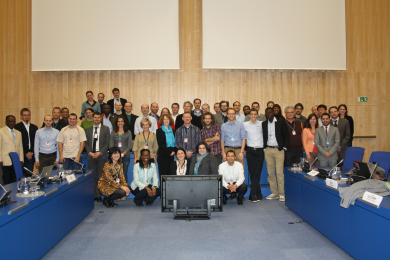On 5 December 2012, UN-SPIDER concluded a three-day international expert meeting on the topic of Crowdsource Mapping for Disaster Risk Management and Emergency Response. 81 participants from a variety of backgrounds attended the meeting. They represented Crowdsource Mapping networks such as Ushahidi or the Humanitarian OpenStreetMap Team, university, entities involved in humanitarian aid, space agencies and UN organizations.
The United Nations recognizes the importance of such new methodologies for disaster risk management and emergency response. In line with UN-SPIDER’s mandate to be a bridge between communities involved in space-based information for disaster and risk management, the goal of the expert meeting was to bring all stakeholders in disaster mapping together to create new networks, exchange ideas and manage expectations. In his welcoming remarks, UN-SPIDER Coordinator Luc St-Pierre underscored: “There is a growing recognition that communities can contribute to managing knowledge.”
During the three day event, more than 25 presentations on topics ranging from Crowdsource Mapping simulation exercises, crowdsource mapping responses to events such as Hurricane Sandy or the Great East Japan Earthquake, cellular infrastructure or citizen seismology. Additionally, related projects and programmes such as GMES-GIO, the ArcGIS Platform or NOMAD were presented, among others.
Three breakout sessions complemented the discussions in the plenary. In a first session, several country profiles were presented to explore the possibilities of crowdsource mapping exercises. The second session was split into three topics: Integrating Space Based Geospatial Info with Crowdsource Data, Risks & Solutions from data of social media and Quality and reliability of crowdsourcing data for disaster management and emergency response. The third breakout session was a result of a common brainstorming that identified Partnerships, Guidelines and Licensing as important issues.
The results of the meeting will be elaborated into a report to be presented to COPUOS and the General Assembly. OOSA director Mazlan Othman stressed in her closing remark the importance of getting all stakeholders at the same table.
All relevant documents as well as the meeting's presentations are available on the Knowledge Portal. During the event, UN-SPIDER as well as various participants additionally tweeted about the meeting using the hashtag #uncem12.

